News and Views
-
Blog: Conservation in Sumatra
-
Meet Arista Ketaren - Conservation in Sumatra
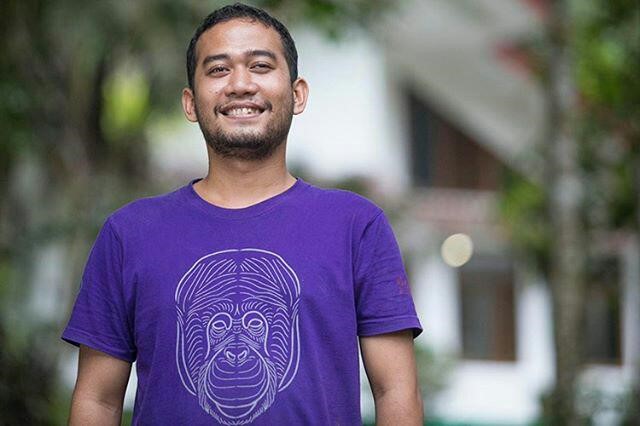
This former DESMAN student is working hard to save the endangered orangutans of Sumatra
I have worked with orangutans at the Sumatran Orangutan Conservation Programme's (SOCP) Quarantine Centre in Northern Sumatra since 2009. Originally I was one of the orangutan keeping staff (Orangutan Technician). In 2015 I was lucky enough to spend a few weeks working as a volunteer with the animal keepers (mostly on primates and carnivores) at Auckland Zoo in New Zealand. In 2017, I was promoted to my current position as manager of the Centre, responsible for managing all the staff and daily operations.
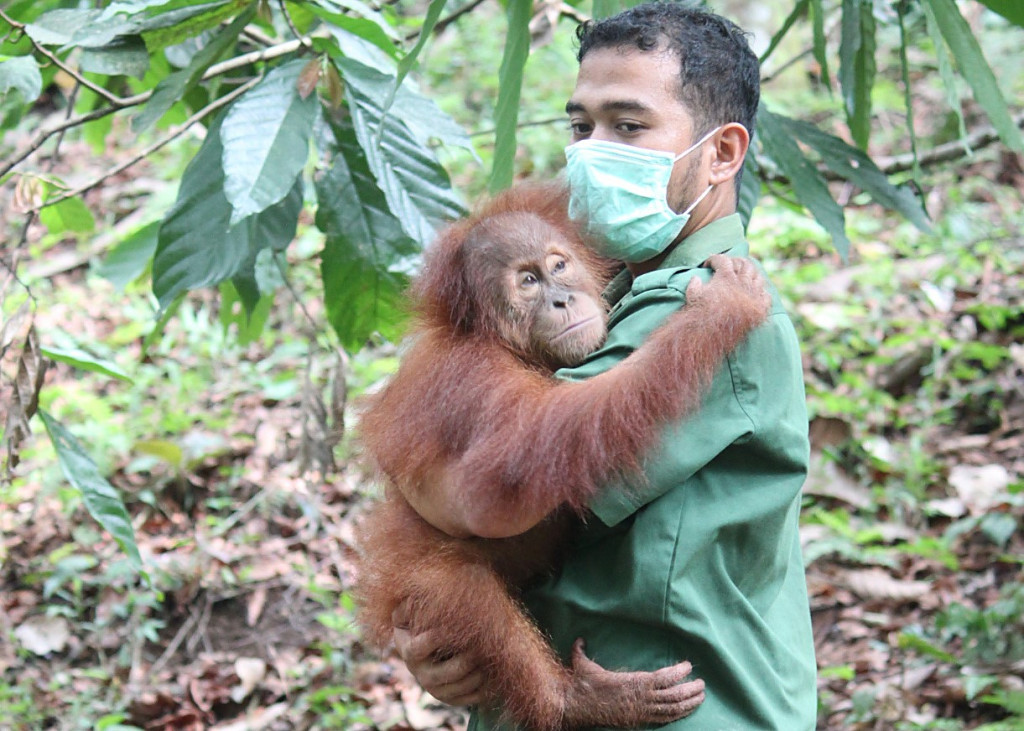
Orangutan Rehabilitation
The Sumatran Orangutan Conservation Programme (SOCP) has been working since 2001 on all aspects of orangutan conservation in Sumatra. A major focus of the SOCP’s work is the rescue, quarantine, rehabilitation and eventual reintroduction of illegal pet orangutans. Since opening, the SOCP’s Orangutan Quarantine and Rehabilitation Centre has received over 410 orangutans and more than 300 of these have been reintroduced back to the wild, helping to create entirely new, viable wild populations of their species.
Our work is not easy, by a long way, and is often very emotional, but the rewards of the progress and the positive achievements constantly inspire the staff at SOCP to persist in their hard work. The centre averages around 50 orangutans at any one time. Most are confiscated illegal pets in need of medical care and rehabilitation in preparation for eventual reintroduction to the wild. Since I began working with the SOCP I have probably worked with more than 200 individual orangutans, most of which have already been released. Sadly, some of the orangutans that find themselves at the centre arrive in devastatingly poor health and condition, and are often traumatised too, and a few of them, even with time and the care that the SOCP provides, are unable to live free in the wild ever again.
At present, there are seven individuals that cannot be released back to their natural habitat, due to physical, or even phsychological disabilities. Even sadder is that their problems were all caused by humans, as is illustrated by the stories of Hope and Leuser, below.
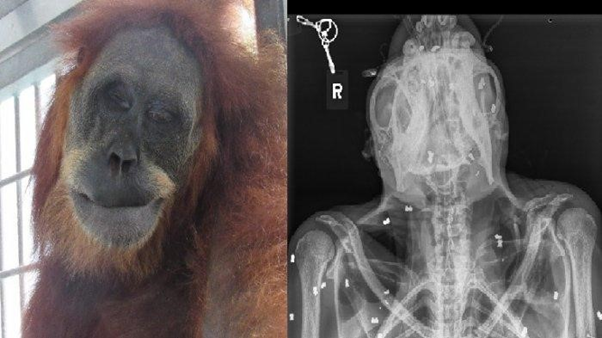
Meet Hope
Hope is an adult female orangutan. She was shot 74 times with an air rifle at the edge of the forest. Some of the pellets are lodged in her eyes, causing permanent blindness. She also and lost her baby during the same incident, a result of human cruelty. Highly traumatised, Hope spent several months recovering from her physical injuries, which included some open lacerations and a broken collar bone, but will take much longer for her to recover from the mental trauma of her experience. She remains afraid when she hears human voices and seems to get upset by the sound of any infant orangutans crying nearby.
Meet Leuser
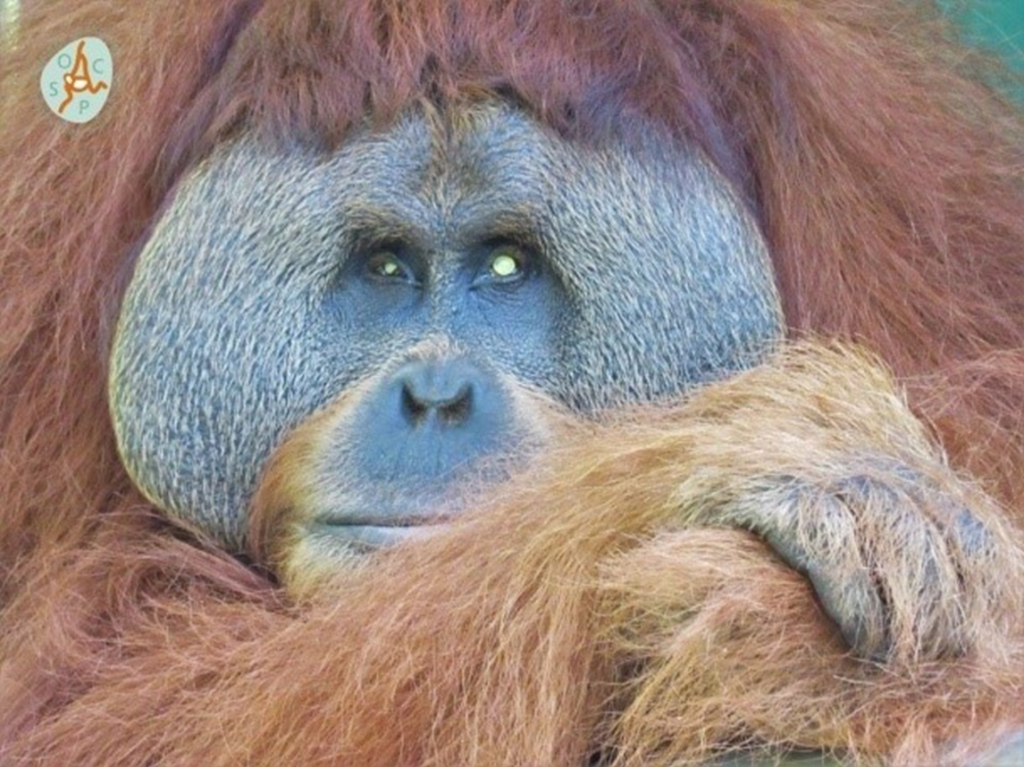
Leuser was shot near the edge of a protected forest by farmers out shooting pests near their crops. We found 62 air rifle pellets scattered around his body and like Hope he is blind as some of them hit him in the eyes. We removed some of the pellets but he still has 48 inside him as removing them all would be too invasive and unnecessarily risky.
Photo right above: Orangutan Leuser. Photo left above : Hope and an X-ray showing air rifle pellets in her head and chest (Source: SOCP)
Sadly, some other orangutans have arrived over the years with similar experiences, but did not survive their ordeal. This is one of the aspects of our work that continually motivates us all to do everything in our power to prevent events like these, violent and very one-sided orangutan human conflicts, from happening in the future.
Rehabilitating and reintroducing orangutans represents just one of many challenges the SOCP faces to protect orangutans in Sumatra. Both species (Pongo abelii and Pongo tapanuliensis) are in decline and are listed as Critically Endangered on the IUCN Red List of Threatened Species due to continued habitat loss and human persecution. Not only are these enigmatic and intelligent Great Apes an incredibly beautiful sight to see in the wild, they also play a vital role in seed dispersal and in maintaining the health of the forest habitat - an ecosystem which is important for people and a wealth of wildlife, including Sumatran tigers, elephants and rhinos.
The Orangutan Haven
Over the years we have accumulated a number of orangutans that cannot be released to the wild. Given that these individuals could live to 40 or even 50 years old or more, we do not want them spending the rest of their days in the large metal cages they are now in at the Quarantine and Rehabilitation Centre. With this in mind, we came up with the idea to try and build some large naturalistic islands, where they could live out their days in a much larger, and naturalistic environment. If we can, we would also like them to somehow be able to play a role in the future of their species, despite not being able to be free in the wild anymore.
Education and raising awareness is an essential part of the SOCP’s long-term approach to conservation, to help address the core of the problem. If we could somehow get visitors to see these orangutans too, we felt this would be a highly innovative and unique mechanism to achieve our goals and get the conservation and sustainable development message across to a large and extremely diverse audience.
The answer? An Orangutan Haven - a new innovation by SOCP to build public awareness to protect and maintain the balance of the ecosystem, building a whole new facility that will integrate education and better quality enclosures for the rehabilitated orangutans.
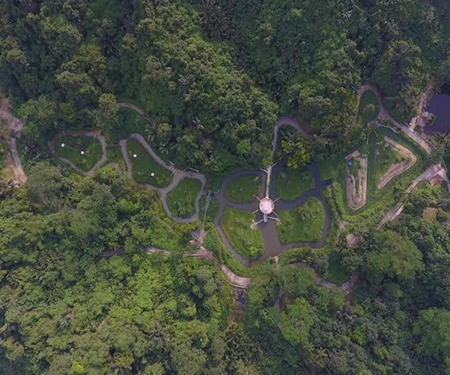 The SOCP secured 48 hectares of land in 2014 and has created 9 islands for
orangutans in a large green valley at the centre of the site.
The SOCP secured 48 hectares of land in 2014 and has created 9 islands for
orangutans in a large green valley at the centre of the site.The idea of islands in the Orangutan Haven was inspired by Dr Ian Singleton, Director of the Sumatran Orangutan Conservation Program (SOCP) and former Animal Keeper at Jersey Zoo, headquarters of the Durrell Wildlife Conservation Trust.
Ian (himself a Durrell graduate), was a key member of the original design team for the ‘Orangutan Island Habitat’ at Jersey Zoo which has been an enormous success, not only for the zoo’s resident orangutans, but as an exciting, immersive attraction to visitors. Following this achievement, Ian and the SOCP hope that the Orangutan Haven in Sumatra will become a major asset for species and habitat conservation, and conservation education and awareness building in northern Sumatra.
Photo Left: Aerial view of the islands valley at the Orangutan Haven, showing all 9 of the newly created Orangutan Islands (Source: SOCP)Big Ambitions
In addition to caring for the orangutans, facilities are also being established at the Orangutan Haven for other endangered animals in Sumatra, including some of Sumatra’s critically endangered song bird species – threatened mostly by the illegal wildlife trade, and Fruit Bats (Pteropusvampyrus) whose numbers are declining rapidly due to capture for the traditional medicine market.
Hands on work with these and other species over the coming years, and the knowledge which Arista gained at Jersey Zoo working alongside keepers and learning from specialist staff, will help to preserve populations of many key species and to deliver educational talks that explain that population declines in the wild will continue if human attitudes and actions do not change.
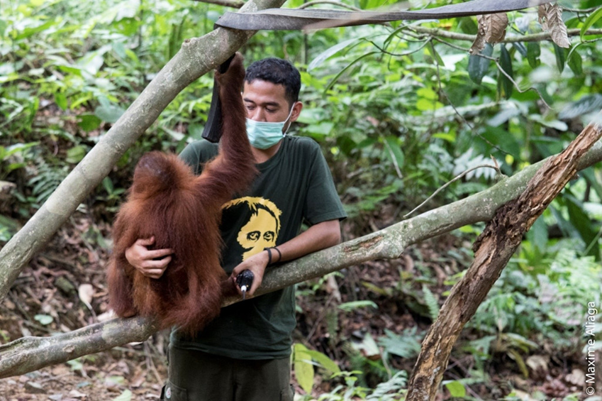
My DESMAN training is invaluable to the SOCP as we gradually develop our Orangutan Haven, with its vast education potential and its plans to establish focussed captive breeding programmes for critically endangered songbird species.
SOCP hopes that through this work it will protect the ecosystem and biodiversity in Indonesia - a fragile home for a truly rich diversity of people and wildlife.
Arista participated in the Durrell Conservation Academy DESMAN course in 2020. This course is designed to equip conservation professionals with a complete range of skills to maximise their effectiveness at managing or participating in conservation projects. You will learn the latest theory and practice of endangered species recovery, and gain a wide variety of skills in facilitation, management and leadership. Click here https://bit.ly/2SSAJJU for more information about the course and other conservation study opportunities.
Find out more about how this DESMAN Alumni and the Sumatran Orangutan Conservation Programme work here: https://www.sumatranorangutan.org/our-work/creating-new-wild-populations/orangutanhaven/
Dr Ian Singleton, MBE, supports a range of vital conservation projects including a unique initiative twinned with Jersey. The mission of "The Size of Jersey" is to restore a rainforest the size of Jersey, specifically 4 illegal palm oil concessions that have been illegally planted within the boundary of the Leuser Ecosystem in Northern Sumatra. By restoring what has been taken away from this vital habitat, their work will also assist Jersey in achieving its 2030 carbon neutrality goal. Read here for more information.
-